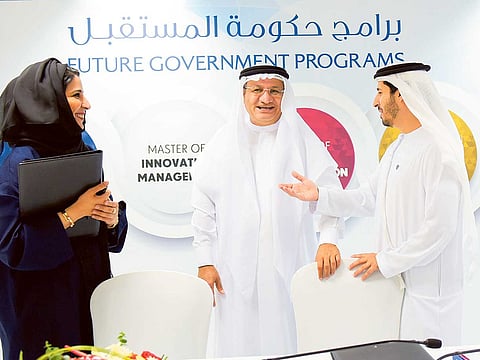New master’s programmes to support UAE future government
Three new programmes were launched to support the transformation of Dubai into a city of the future

Dubai: A series of new master’s programmes that aim to equip employees in private and government entities with specialised skills were launched by the Mohammad Bin Rashid School of Government (MBRSG) on Wednesday.
The three new programmes were launched to support the transformation of Dubai into a city of the future by preparing a generation of employees and equipping them with the skill set needed to achieve the government’s vision, it was announced by the MBRSG, a research and educational institution specialising in public policy in the Arab world.
The programmes come under the theme ‘The Future Government’ and include the Master in Innovation Management (MIM), the Executive Master of Public Administration (EMPA) and the Master of Public Policy (MPP).
According to Raed Awamleh, Dean of MBRSG, studies by the MBRSG have shown that there is a need in these specialisations for the future within the government and that these programmes, offered in full-time and part-time, will enhance the capabilities of employees so that they can help implement progressive governance practices.
“We have matched the programmes with the government’s initiatives and needs. We had developed programmes based on what the government is focusing on in the next few years and the sectors of importance to them. We also saw the focus on policy, innovation and the Arabic language, for instance, within the government, and we developed the programmes based on that,” he said.
The school, which has graduated up to 120 students since it launched its academic programmes in 2007, will be accepting the first batch of students for the new programmes in March, he added, noting that the EMPA programme will be the first of its kind taught in Arabic.
“Those who are willing to apply must have some work experience, preferably in the government sector, but we can also look at those working in international organisations and NGOs who have public policy and public administration practice.”
The MIM is the first degree of its kind in the UAE that supports the National Innovation Strategy through providing students with the tools needed to keep up with modern-day changes, while the EMPA introduces candidates to the most up-to-date governance practices and international government management techniques.
The third programme, MPP, provides participants with the theoretical and practical knowledge necessary for high-quality policy and strategy development.
At the conference, Humaid Mohammad Al Qatami, chairman of the MBRSG Board of Trustees and director-general of the Dubai Health Authority, said for years, MBRSG has been at the forefront of advancing government work in the UAE, and the wider Arab world, by providing academic programmes in line with the latest trends in public administration.
“These new programmes aim to deepen the positive impact of the school, raise the standards of employees in the government and private sectors, and refine their skill set in the areas that are most crucial to their organisations,” he said.
The MBRSG is handing over a Dh10,000 grant for citizens and a Dh10,000 grant for non-Emiratis working in the government sector. These grants can be used to deduct from the total fees of the programme they are joining. Citizens working in government sector will get an additional Dh10,000.
Dr Ali Sebaa Al Merri, executive president of MBRSG, said they are keen on collaborating with government entities to enhance the capabilities of their employees so that they can help implement progressive governance practices that will set the UAE at the forefront of government work.
“In line with the vision of our leadership, MBRSG encourages more effective communication and exchange of knowledge in local and international best practices to boost management and leadership expertise.”
Sign up for the Daily Briefing
Get the latest news and updates straight to your inbox



